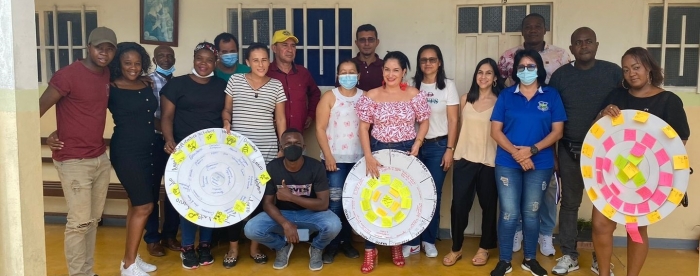Apropiación social de las estrategias de monitoreo y restauración en Calamar
Tropenbos Colombia viene desarrollando una estrategia metodológica orientada al fortalecimiento del soporte sociocultural de los procesos de monitoreo y de restauración adelantados por WWF en Calamar. La implementación comenzó en abril del 2021, se han llevado a cabo aproximadamente 10 talleres y ya son visibles algunos cambios en la relación entre la comunidad local y el bosque.
WWF Colombia is developing a monitoring and restoration process in the critical areas surrounding the National Natural Park Serranía de Chiribiquete where there is a tangible increase in the pressure of deforestation. This work has concentrated in two of the municipalities in the Caquetá and Guaviare departments with higher deforestation indexes: Belén de los Andaquíes and Calamar.
The population in these areas are mainly peasants that have assumed cattle raising as their main economic activity, together with illegal cultivations. These communities live under strong pressure from armed groups. Such a vulnerable situation has implied the expansion of the agricultural frontier causing the fragmentation of the forest and threatening the adjacent park.
To contribute to changing this tendency, Tropenbos Colombia has designed a methodological strategy to strengthen the sociocultural aspects of the monitoring and restoration processes carried out by WWF in Calamar. The implementation began on April 2021; at least 10 workshops have taken place so far. We can already see some changes among the relationship between the community and the forest.
Through the creation of new scenarios for social appropriation, Tropenbos Colombia is making local knowledge be seen, recognized, and discussed. By facilitating meetings with teachers from local schools, people are starting to understand the importance of participating more actively in the local decisions about the territory ordering and of promoting a future with equality, inclusion and justice in their territory. These strategies favor the recognition of local knowledge, practices and experiences. They also activate the participation of women and youths as well as their visions and valorization of the forest. They also promote intercultural agreements for the management of the territory among peasants and indigenous communities.
From Tropenbos Colombia´s perspective, it is also crucial to work together with local schools so that the social appropriation process of the monitoring of natural resources and the restoration of the forest become a long-term reality. With the inclusion of local elements about the value and knowledge of the forest, we expect a more effective participation of families and teachers in the process.


